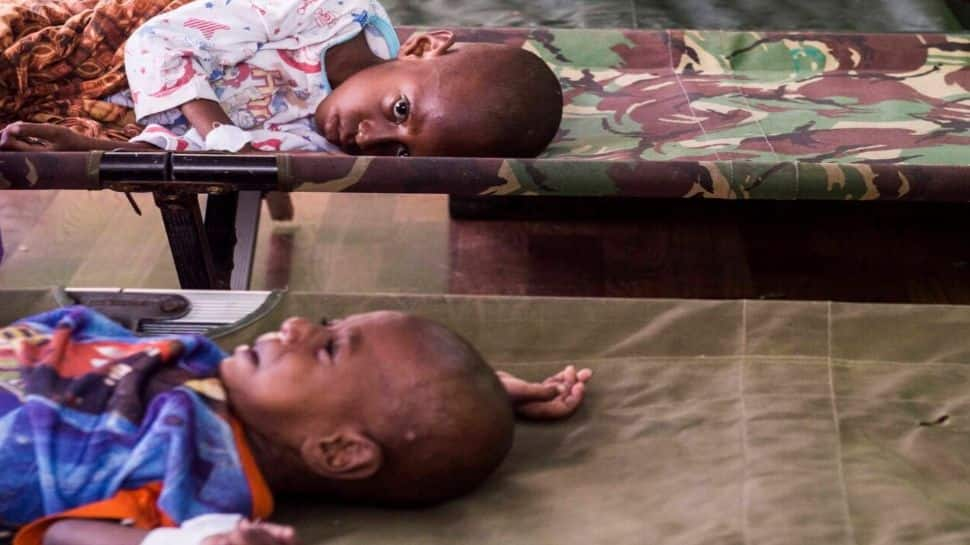World
Indonesia Struggles to Sustain Free School Meals Amid Controversy

Jakarta has embarked on a significant initiative aimed at combating child malnutrition by providing free meals to school children. Launched six months ago, this program is part of President Prabowo Subianto’s vision to position Indonesia as a “golden nation” by its centenary of independence in 2045. The government aims to address the pressing issue of child malnutrition, which affects many young Indonesians, by reaching approximately 80 million children across the archipelago.
Child malnutrition is a critical concern in Indonesia, where nearly one in five children is shorter than the average for their age, and one in 14 suffers from extreme thinness. This situation jeopardizes their future health and development, increasing their vulnerability to illnesses. Various factors contribute to this crisis, including Indonesia’s vast population of 285 million, cultural diversity, and limited access to education. Many remote regions face significant challenges in delivering necessary aid due to poor infrastructure.
The socioeconomic landscape complicates the issue further, with about 60.3% of the population living below the poverty line, predominantly in underdeveloped areas. Access to safe drinking water is also a critical issue; a 2022 UNICEF study revealed that 70% of drinking water in Indonesian homes contained contaminants. Additionally, misconceptions about nutrition and hygiene are prevalent, with many caregivers unaware of what constitutes a healthy diet.
The free meal program is designed to enhance children’s health and educational outcomes. President Prabowo has stated that ending child malnutrition is vital for strengthening the nation’s economy. His administration has committed around 10% of the national budget to this initiative. Despite the ambitious goal of feeding over 80 million children, the program has only reached about 5 million thus far.
Challenges in Implementation
Implementing such a large-scale program presents numerous challenges. Infrastructure deficits hinder effective distribution, while concerns about food safety have arisen, with reports of food poisoning among some children. Critics argue that the program was rushed, leaving insufficient time to address essential operational details. There are also questions about whether the country has enough skilled personnel to prepare and serve the meals safely.
The public perception of the program is mixed, with transparency issues leading to skepticism about its effectiveness. Many people are uncertain as to why child malnutrition remains a pressing issue despite government efforts. Some observers suggest that the president may be leveraging this initiative to enhance his public image.
Indonesia can look to India for a precedent on free meal programs. In 2001, India’s Supreme Court recognized cooked nutritious meals as a constitutional right for children in government schools. The mid-day meal scheme, which began in states like Tamil Nadu and Kerala, has successfully increased school attendance and improved literacy rates, especially among girls. The initiative required considerable investment in infrastructure, such as schools and kitchens, to ensure its sustainability.
Public Reaction and Economic Implications
Despite its ambitious goals, the response in Indonesia has been mixed. To fund the free meal program, President Prabowo implemented an 8% cut in public spending, disproportionately affecting education budgets. This decision has sparked protests among students, who have rallied under the banner of “Black Indonesia” to highlight the inadequacies of the government’s educational policies. Many believe that the program does not adequately address their educational needs.
Local governments and unemployed citizens have expressed opposition to the cuts, fearing that reduced funding will harm local economies and job opportunities. The country faces additional challenges related to rice production, a staple food. Despite being a significant producer, Indonesia imports substantial quantities of rice, which makes prices unstable. Experts suggest that the free meal initiative should prioritize local grains to support domestic farmers and align with children’s dietary habits.
The role of the military in the meal preparation process is another point of contention, particularly after reports of children falling ill from food sourced from military kitchens. Critics argue that this approach undermines local vendors and small businesses, contradicting promises to create job opportunities within communities.
As the government faces budgetary pressures, the sustainability of the free meal program remains uncertain. Without increased funding, further cuts may be necessary, which could have dire consequences for the economy and public health. Raising family incomes is crucial so that parents can provide nutritious food independently.
Indonesia’s free meal initiative reflects a bold commitment to addressing child malnutrition, yet it faces formidable challenges that must be navigated to achieve its ambitious goals. The ability of the government to effectively address these issues will ultimately determine the program’s success and its impact on the nation’s future.
-

 World5 months ago
World5 months agoSBI Announces QIP Floor Price at ₹811.05 Per Share
-

 Lifestyle5 months ago
Lifestyle5 months agoCept Unveils ₹3.1 Crore Urban Mobility Plan for Sustainable Growth
-

 Science4 months ago
Science4 months agoNew Blood Group Discovered in South Indian Woman at Rotary Centre
-

 World5 months ago
World5 months agoTorrential Rains Cause Flash Flooding in New York and New Jersey
-

 Top Stories5 months ago
Top Stories5 months agoKonkani Cultural Organisation to Host Pearl Jubilee in Abu Dhabi
-

 Sports4 months ago
Sports4 months agoBroad Advocates for Bowling Change Ahead of Final Test Against India
-

 Science5 months ago
Science5 months agoNothing Headphone 1 Review: A Bold Contender in Audio Design
-

 Top Stories5 months ago
Top Stories5 months agoAir India Crash Investigation Highlights Boeing Fuel Switch Concerns
-

 Business5 months ago
Business5 months agoIndian Stock Market Rebounds: Sensex and Nifty Rise After Four-Day Decline
-

 Sports4 months ago
Sports4 months agoCristian Totti Retires at 19: Pressure of Fame Takes Toll
-

 Politics5 months ago
Politics5 months agoAbandoned Doberman Finds New Home After Journey to Prague
-

 Top Stories5 months ago
Top Stories5 months agoPatna Bank Manager Abhishek Varun Found Dead in Well









